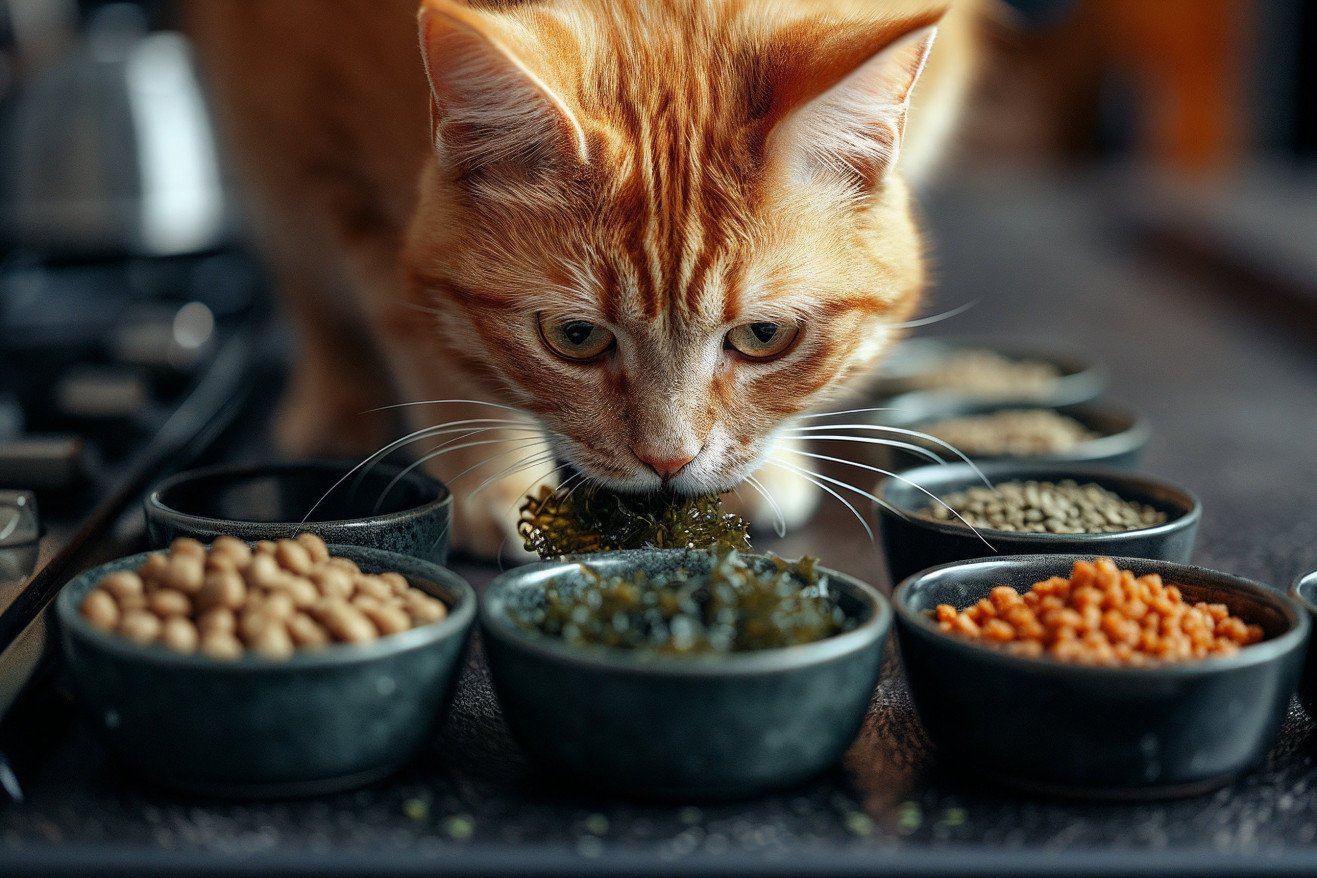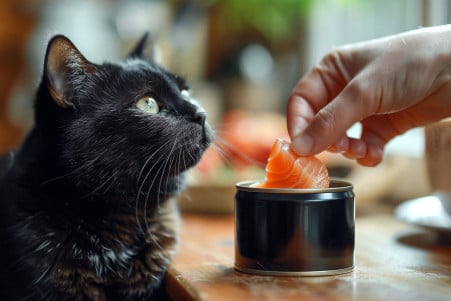Can Cats Eat Seaweed? Unpacking the Benefits and Risks for Feline Health
9 February 2024 • Updated 11 February 2024

Seaweed is a food that holds a lot of promise in terms of nutrition, but is it a good idea to let your cat have a taste? While cats can eat seaweed in small amounts and benefit from the iodine, vitamins, and minerals it contains, too much iodine from seaweed can be harmful and even lead to hyperthyroidism.
As a result, you should always talk to your vet and, when you do give your cat seaweed, make sure it’s plain and free of seasonings.
We will get to the bottom of feline nutrition by looking at veterinary research and nutritional science to determine how seaweed can fit into a cat’s diet. We will discuss the benefits and drawbacks of seaweed as a supplement, the role of iodine, and the risks of overconsumption.
By evaluating the insights of experts and the findings of studies, we will offer the information you need to decide whether or not to feed your cat seaweed.
Can cats eat seaweed?
Seaweed and Cat Diets: How to Get the Balance Right
Seaweed, a veritable underwater treasure trove, is loaded with a wide array of nutrients including dietary fiber, omega-3 fatty acids, essential amino acids, and a medley of vitamins A, B, C, and E.
According to Healthline, seaweed is also a good source of minerals and trace elements, such as protein, fat, carbohydrates, fiber, folate, and essential minerals like copper, iron, and magnesium. But the most important mineral in seaweed is iodine, which is necessary for healthy thyroid function and metabolism in cats.
While cats need a diet that’s rich in protein and fat, there may be some benefits to adding certain seaweed nutrients to their diet. That said, the iodine content in seaweed can vary widely and too much iodine can cause a number of health problems in cats, including hyperthyroidism.
According to StatPearls, iodine is an essential component of the thyroid hormones that regulate metabolism, but iodine toxicity can occur with excessive intake, leading to gastrointestinal symptoms or more serious problems.
In addition, cats are particularly sensitive to heavy metals, which can be found in seaweed, so it’s important to be cautious about introducing it into their diet.
Since the FDA doesn’t regulate the use of seaweed in pet food, the potential for heavy metal contamination is a concern. As a result, if you’re thinking of adding seaweed to your cat’s diet as a supplement, it’s important to weigh the potential health benefits against the potential for nutrient toxicity and contamination.
Iodine and Its Role in the Thyroid and Toxicity in Cats
Iodine is a trace mineral that is particularly abundant in seaweed. It is essential for the proper functioning of the thyroid gland, which controls the body’s metabolism and other important functions.
Yet, as shown in a 2023 article by Hansen et al. in Scientific Reports, dietary iodine fluctuations can lead to hyperthyroidism, a condition that is similar to toxic nodular goitre in humans. Clinical signs of iodine toxicity in cats can include weight loss, vomiting, increased water intake, and hyperactivity.
The article “Estimating short and longer-term exposure of domestic cats to dietary iodine fluctuation” demonstrates that domestic cats have a high degree of iodine intake variability. This is due to the wide range of iodine levels in commercial pet foods, particularly those that contain fish-based products, which are known for their high iodine content.
Therefore, it is important to ensure that cats are fed a consistent amount of dietary iodine to avoid the uncontrolled growth of thyroid nodules, which can happen regardless of thyroid-stimulating hormone control.
Veterinary professionals may recommend an iodine-restricted diet to help manage iodine levels and reduce the risk of toxicity in cats with hyperthyroidism.
The article “Effect of Feeding an Iodine-Restricted Diet in Cats with Spontaneous Hyperthyroidism” published in PMC shows that these diets are successful in normalizing thyroid hormone levels.
As a result, it is important to ensure that a cat’s diet is balanced in terms of iodine. If a cat’s diet is deficient in iodine, it can lead to thyroid dysfunction, but if a cat’s diet has too much iodine, it can lead to hyperthyroidism. This means that any dietary changes, including the addition of seaweed, should be done with caution.
The Bottom Line: The Good and Bad of Seaweed for Cats
Seaweed can help cats in a number of ways, including aiding in digestion and improving skin and coat health. According to CatTime, seaweed acts as an antacid, which can help cats with heartburn and indigestion, and it can also help improve the shine and overall health of their skin.
That said, there are also a number of downsides. For example, while iodine is important for the thyroid, it can also be toxic in large amounts. Cats Are On Top explains that hyperthyroidism and iodine toxicity can both be caused by overconsumption of seaweed.
In fact, a study published in PubMed found that an iodine-restricted diet was an effective way to manage feline hyperthyroidism. However, this is something that should be done under the care of a vet. If you’re thinking about adding seaweed to your cat’s diet, it should be done as a supplement rather than a main course, and it should be introduced slowly and served plain with no additional ingredients.
Adding seaweed to your cat’s diet is all about balance: weighing the nutritional benefits against the potential downsides. It’s important to work with a vet to customize your cat’s diet to their needs and make sure that any new additions to their diet are in line with their overall health.
Seaweed on the Menu: How to Introduce Seaweed Into Your Cat’s Diet
Introduce seaweed into your cat’s diet slowly and with caution. Both PetMD and Royal Canin advise a gradual introduction to prevent digestive issues. Start by adding a small amount of seaweed to your cat’s regular food, and increase the amount of seaweed over the course of a week.
You should start with a mix that’s 75% regular food and 25% seaweed, then move to a 50/50 mix, then a 75% seaweed mix, and finally a 100% seaweed mix after seven days.
Pay close attention to how your cat responds to the new ingredient, as the Cornell Feline Health Center notes that changes in diet can lead to food allergies and sensitivities. Watch for signs of digestive upset or refusal to eat, and make sure the amount of seaweed you’re adding to your cat’s food is small to avoid giving them too much iodine.
Talk to your vet before adding any new foods to your cat’s diet to make sure that seaweed is safe for your cat’s specific health needs. This is important to ensure that you can take advantage of seaweed’s nutritional properties without putting your cat at risk.
If you follow these steps, you can add seaweed to your cat’s diet in a way that will help them get the most nutritional benefit from it while keeping them safe.
How to Choose Marine-Based Supplements for Your Cat
When looking to improve your cat’s health, marine-based supplements are a popular choice. For example, fish oil is a popular option that contains omega-3 fatty acids, which are good for skin and coat health, anti-inflammatory effects, and heart and kidney support, according to PetCareRx. Fish oil also contains EPA and DHA, which are essential fatty acids that cats can’t make enough of on their own.
Kelp, another marine supplement, is known for its high vitamin and mineral content, including omega-3 fatty acids and dietary fibers, according to Life Line Pet Nutrition. Kelp is also known for its ability to support dental health, reduce tartar, and improve coat health, as well as other benefits like improving circulation and aiding in digestion.
When compared to seaweed, fish oil and kelp may offer similar nutritional and safety benefits without the risk of iodine toxicity. It’s also important to look for supplements like kelp that have NASC certification, according to The Spruce Pets, as this will ensure that the supplement has been tested for quality, which is an important consideration when choosing a supplement.
While the benefits of marine supplements like fish oil and kelp are clear, it’s important to talk to your veterinarian to determine which supplement is best for your cat based on their specific health concerns and health history.
Seaweed for Cats: The Bottom Line
Seaweed, with its many nutrients, can be a great addition to your cat’s diet in moderation. It contains important vitamins and minerals, including iodine, which is necessary for proper thyroid function. However, the iodine in seaweed can also lead to hyperthyroidism if consumed in high amounts, meaning that pet parents need to be careful about how much they give to their cats.
As mentioned, it’s important to use seaweed in moderation and under the guidance of a vet. This is especially important so that you can understand your cat’s individual nutritional needs and health concerns. More studies and professional input can help you better understand how to safely and effectively use seaweed as a dietary supplement for cats.
In summary, seaweed can be a healthy addition to your cat’s diet, but it’s important to carefully consider the potential risks and benefits. Part of being a responsible pet owner is making sure that you’re making informed decisions about your cat’s diet so that any supplements you give them will help support their health without causing any harm.


